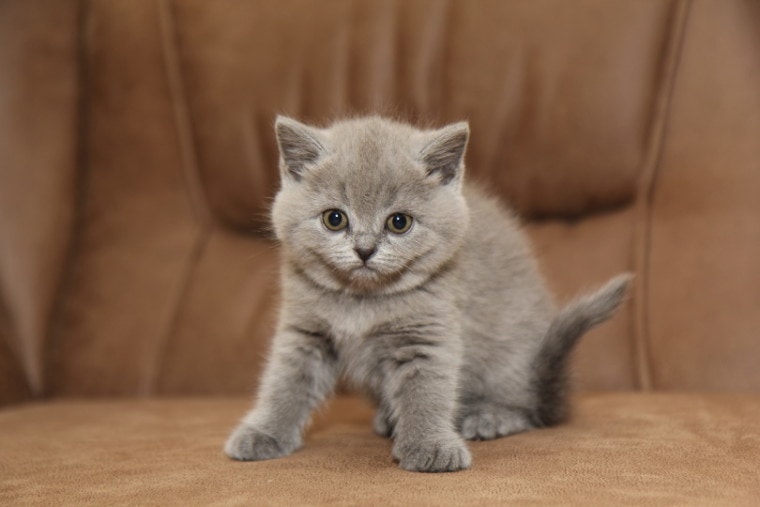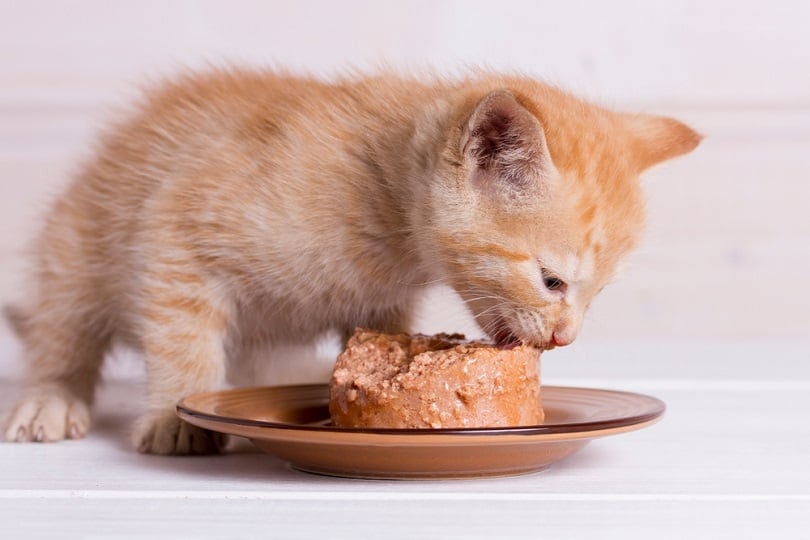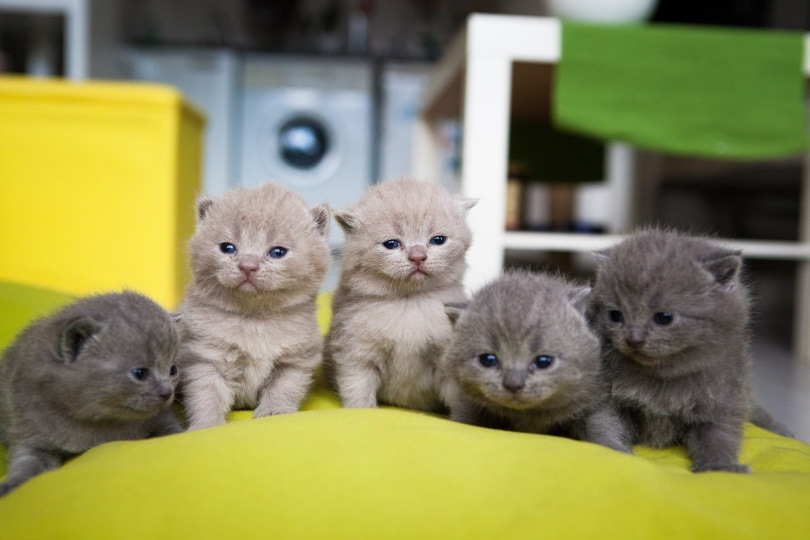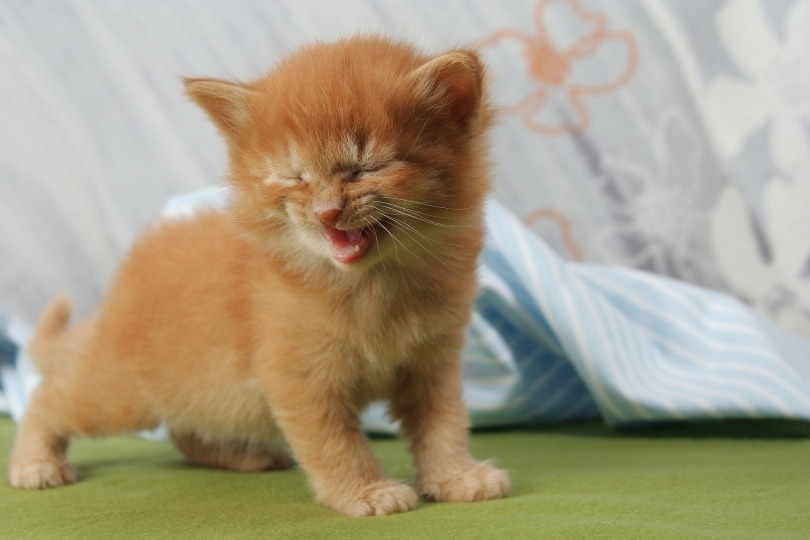
Cats have a reputation of being independent, but they don’t start off that way. Infant kittens are quite helpless and need a lot of care, attention, and assistance. One of the things they need help with is urinating and defecating. Kittens will poop on their own once they reach 3-4 weeks old. Until then, they need help with relieving themselves.
It’s not the cleanest job, but it’s important to understand the developmental processes of kittens’ abilities to relieve themselves. Proper care in this arena will keep your kittens healthy and avoid any urinary tract infections and constipation.
How Do I Massage My Kitten to Poop?
Usually, young kittens under the age of 3 weeks receive help from their mother to relieve themselves. Kittens at this age haven’t developed the awareness and ability to go on their own just yet, so they need some assistance.
Mother cats will encourage their kittens to poop by licking them. If you have orphaned kittens, you’ll have to mimic a mother cat’s actions to get the kittens to pee and poop.
You can help kittens poop after they’ve finished eating. Start by using a damp washcloth or cotton ball. These items feel similar to a mother cat’s tongue.

Gently pick up the kitten with your non-dominant hand. Then, use the washcloth or cotton ball to massage the kitten’s anal area gently. You may have to massage for 10-40 seconds.
This motion should help the kitten to relieve itself. Keep massaging until the kitten stops peeing or pooping. Once the kitten has finished, make sure to clean and wipe it up. Do a thorough job of cleaning up your kitten’s anal area after each time it goes to the bathroom to avoid infections. Gentle and hypoallergenic cat-safe cleaning wipes are safe to use to keep your kittens clean and deodorize any smells.
The whole process of getting your kittens to relieve themselves shouldn’t take more than a minute. If there are several consecutive instances where the kitten doesn’t relieve itself within a minute, call your veterinarian to figure out what’s causing the issue.
Sometimes, a kitten will spit up milk after a feeding. If this occurs, try switching up the order. Massage the kitten first and see if it relieves itself. Then, proceed to feed it.
How Often Should a 2-Week-Old Kitten Poop?
Two-week-old kittens usually urinate with every massage. They may poop about once or twice a day. If a kitten goes a day without pooping, it’s time for a visit to the vet.

Why Is My Kitten Peeing But Not Pooping?
There are several reasons why kittens experience constipation. They can be dehydrated or have something blocking their digestive tract, such as hairballs. Parasitic worms can also prevent pooping.
Sometimes, kittens have congenital disabilities, which makes it extremely difficult to poop. If your kittens are peeing but not pooping make sure to contact your veterinarian right away. Your veterinarian can diagnose the issue and provide a regimen to help your kittens have regular bowel movements.

At What Age Can You Litter Box Train a Kitten?
Litter box training can start as soon as a kitten reaches 4 weeks old. It’s usually very easy to train kittens to use a litter box because they naturally prefer to relieve themselves in specific areas.
How Do You Litter Box Train a Kitten?
When you first start litter training, use a smaller litter box so that your kitten doesn’t feel intimidated by the size. Place multiple litter boxes throughout the house in well-lit places that are easy to find.
Next, place your kitten in each litter box so that it becomes familiar to them. Some kittens will instinctually relieve themselves. Reinforce these wanted behaviors by providing a treat every time your kitten uses a litter box.
If your kitten doesn’t take to using the litter box right away, you can take it to the litter box every time after it wakes up, eats, or drinks. Watch and wait for it to pee or poop before letting it go. Always praise your kitten and give it a treat every time it uses the litter box successfully.

Never scold or yell at your cat if they miss the litter box. This can actually end up reinforcing negative behaviors. Instead, thoroughly clean the spot with a cleaner in order to prevent your cat from habitually relieving itself in the unwanted areas.
If your kitten has a particularly difficult time learning to use a litter box, don’t hesitate to work with a cat behaviorist. A cat behaviorist can help you figure out the root cause of the problem and develop appropriate responses and solutions to address it.
How Do I Know When My Kitten Needs to Poop?
If your kitten isn’t using a litter box very well, you’ll have to place it in the litter box yourself and wait for it to use it.
Kittens usually display some signs that indicate that they need to poop. Some of these signs include sniffing the ground excessively and meowing. They may also dig the cat litter right before they pee.
If you see your kitten doing any of these things, gently pick it up and place it in the litter box if it’s not already there. Wait until it goes to the bathroom. Then, provide an immediate reward.

It’s also helpful to keep track of your kittens’ habits. Document how often they need to relieve themselves per day and at what times of days they go to the bathroom. You can also time how long it takes for your kitten to pee or poop after it eats or drinks.
Tracking these things will help you to anticipate when your cat will need to use the litter box. This will increase the chances of your kitten successfully using the litter box and picking up the habit more quickly.
Conclusion
During the first month of their lives, kittens are very dependent and defenseless. They need a lot of help, including peeing and pooping. Once they hit the 4-week milestone, they can usually poop on their own and begin litter box training.
Fortunately, kittens take to litter box training relatively quickly, so with a little patience and consistency, your kittens will be housebroken in no time.
Featured Image Credit: Alisa Kolesnikova, Shutterstock







